Review: Harry Potter and the Half-Blood Prince
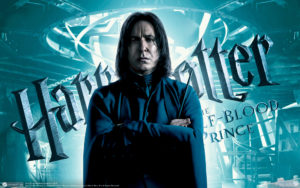
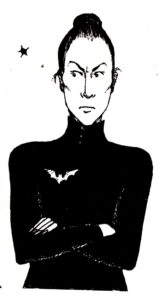
Mrs. Hardbroom
One of the essential problems with writing what is, in effect, a boarding school story is the need for an antagonist. In most of those books, there is generally a harsh (or sadistic) teacher who takes an unreasonable dislike to the protagonist and a younger boy or girl who is little more than a bully. Their role in the story is to be beaten and humiliated by the hero; we are meant to cheer their defeat and take hope from it, even though most bullies never receive the comeuppance they deserve. Those who read The Worst Witch will have no trouble in recognising Mrs Hardbroom and Ethel Hallow as the harsh teacher and school bully respectively. Indeed, it is really quite striking just how much they have in common with Severus Snape and Draco Malfoy.
But Snape and Malfoy have a serious problem when it comes to taking their place amidst ye olde traditional stereotypes. They are both overshadowed – significantly overshadowed – by Lord Voldemort. Book-Draco does not appear to be anything remotely resembling a serious threat to Harry and his friends, even though he has two walking slabs of muscle to back him up. How can Draco’s constant bids for attention from Harry compete with the Dark Lord who wants to kill him? Even Snape is hardly bound to his role as a strict and sadistic teacher from hell. Quite apart from his double role in the war, Snape may snap and snarl, but – when he is given a whole string of perfect opportunities to get Harry expelled, he does nothing. It’s hard to take Snape seriously as a threat by the time we reach Half-Blood Prince. He may be a pain, but he’s one of the good guys.
Or is he? Book Six throws everything into doubt.
Half-Blood Prince opens with Professor Dumbledore arriving to collect Harry from his relatives – and, in doing so, resuming the tradition of either giving the Dursleys their comeuppance or bullying a trio of defenceless victims. Having chewed them out for their neglect of both Harry and Dudley, Dumbledore whisks Harry away to meet with Professor Horace Slughorn, the former Potions Teacher – and Head of Slytherin House – in hopes of convincing him to return to Hogwarts. Harry, assuming that Slughorn will be the next ill-fated DADA teacher, does his best. Slughorn, reluctantly, agrees.
Returning to Hogwarts on the train, Harry notes that Draco is acting suspiciously and tries to spy on him. However, this ends badly; Draco traps Harry with a spell, then hides him on the express. Harry is lucky to be found before the train goes back to … well, wherever the train goes when it isn’t needed. Entering Hogwarts, he discovers – to his horror – that Slughorn is  taking up his old job as Potions Teacher, while SNAPE is the new DADA teacher. (Harry doesn’t realise it, but if Snape had kept up his old standards Harry would have been the ONLY pupil in his class.) Surprisingly, or perhaps not, Snape proves to be a good DADA teacher. Things don’t seem to go so well in Potions until Harry discovers that his textbook has all kinds of notes scribbled in the margins, written by the mysterious Half-Blood Prince.
taking up his old job as Potions Teacher, while SNAPE is the new DADA teacher. (Harry doesn’t realise it, but if Snape had kept up his old standards Harry would have been the ONLY pupil in his class.) Surprisingly, or perhaps not, Snape proves to be a good DADA teacher. Things don’t seem to go so well in Potions until Harry discovers that his textbook has all kinds of notes scribbled in the margins, written by the mysterious Half-Blood Prince.
Harry spends his term getting Voldemort’s backstory from Dumbledore, falling in love (or at least lust) with Ginny and watching Draco for signs that he’s up to something, even though his friends think Draco is just keeping a low profile because his father is currently in jail. (Dumbledore snarks that Lucius Malfoy should be grateful, as – sooner or later – Voldemort will want the diary from Book Two back and it has already been destroyed.) Harry’s investigations end in near-disaster as, using one of the Half-Blood Prince’s spells, he seriously wounds Draco in self-defence. Snape resists the opportunity to get Harry expelled, once again (McGonagall says Harry should have been expelled). Harry, more convinced than ever that Draco is up to something, resolves to watch him more closely. A series of nasty incidents – Ron nearly being killed, for one – seems to underline the growing threat.
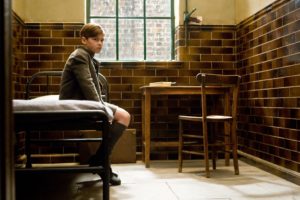 Eventually, Dumbledore takes Harry on a trip to one of Tom Riddle’s old haunts, a sea cave near his orphanage. There, Dumbledore is seriously wounded, but they manage to recover an old locket. It is, apparently, a piece of Voldemort’s soul. Returning to Hogwarts, however, they discover the school has been invaded by the Death Eaters – and, landing on a tower, they are confronted by Draco. Dumbledore, concealing Harry under a spell, talks gently to Draco, offering him the chance to go into hiding instead of killing his headmaster. But, when Snape arrives, he kills Dumbledore and flees the school. Harry gives chase, but Snape batters away every spell Harry aims at him and reveals that he is the Half-Blood Prince. Vanishing into the night, he leaves Harry alone.
Eventually, Dumbledore takes Harry on a trip to one of Tom Riddle’s old haunts, a sea cave near his orphanage. There, Dumbledore is seriously wounded, but they manage to recover an old locket. It is, apparently, a piece of Voldemort’s soul. Returning to Hogwarts, however, they discover the school has been invaded by the Death Eaters – and, landing on a tower, they are confronted by Draco. Dumbledore, concealing Harry under a spell, talks gently to Draco, offering him the chance to go into hiding instead of killing his headmaster. But, when Snape arrives, he kills Dumbledore and flees the school. Harry gives chase, but Snape batters away every spell Harry aims at him and reveals that he is the Half-Blood Prince. Vanishing into the night, he leaves Harry alone.
And, after Dumbledore’s funeral, Harry goes back to his relatives.
It’s amusing to note that, in every book, there is always someone worse than Snape at the school and, except in Half-Blood Prince, that person is the DADA instructor. In Half-Blood Prince, it’s Draco, who manages to figure out a way through the school’s wards and get an assault force into position to kill Dumbledore. But Draco really doesn’t want to go through with it, even though he has no choice. The simple fact that he could have taken a bound and helpless Harry to Voldemort after the incident in the train is clear proof that his heart really isn’t in it. Draco is nothing more than Voldemort’s tool and he knows it. Worst of all, perhaps, is the simple knowledge that Voldemort really doesn’t care if Draco comes back or not. Poor Draco has no one to trust …
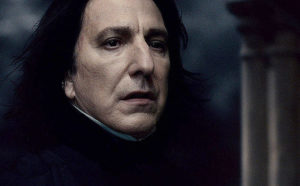 … Which is ironic, as Snape has sworn an oath to protect him and – if necessary – complete Draco’s task. But Draco doesn’t know this and, it seems, fears the consequences of Snape doing the deed almost as much as the price of failure. (A normal Death Eater would use Dumbledore’s death to promote himself and to hell with little Draco.) Snape and Dumbledore, all too aware that Draco is a loose cannon who is growing increasingly desperate, have to try to keep him under some kind of control even as time starts to run out. I don’t envy them.
… Which is ironic, as Snape has sworn an oath to protect him and – if necessary – complete Draco’s task. But Draco doesn’t know this and, it seems, fears the consequences of Snape doing the deed almost as much as the price of failure. (A normal Death Eater would use Dumbledore’s death to promote himself and to hell with little Draco.) Snape and Dumbledore, all too aware that Draco is a loose cannon who is growing increasingly desperate, have to try to keep him under some kind of control even as time starts to run out. I don’t envy them.
Snape himself gets more development during this story, ironically revealing that his background (witch mother, muggle father) has an awful lot in common with Lord Voldemort’s. Harry finds himself liking the person who speaks to him from the textbook, although – after Chamber of Secrets – you’d think he’d be a little more wary. Snape stands revealed as a genius wizard of great promise, whose opportunities were stolen by bitterness and war. He is pretty much wasted at Hogwarts and he knows it. (Slughorn is nowhere near as clever as Snape, but he’s a better teacher.) Snape and Harry have a great deal in common too.
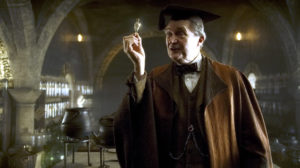 Half-Blood Prince also introduces Slughorn, who is unashamedly the first truly (and undisputedly) good Slytherin. In many ways, Slughorn embodies the virtues of his house and demonstrates how a Slytherin can get ahead; in his case, he patronises promising students and later calls on them for favours. (The ones listed are strikingly harmless, but – in his prime – Slughorn must have collected a great deal of behind-the-scenes influence.) Rowling also balances this by introducing two Gryffindor students who are far from perfect, Lavender Brown (annoying girly-girl) and Cormac McLaggen (jerk jock). One might think that they don’t need including, as we already had more than enough proof that Gryffindor House had its bad apples (Fred and George, James Potter, Sirius Black, Peter Pettigrew), but it provides for some extra drama.
Half-Blood Prince also introduces Slughorn, who is unashamedly the first truly (and undisputedly) good Slytherin. In many ways, Slughorn embodies the virtues of his house and demonstrates how a Slytherin can get ahead; in his case, he patronises promising students and later calls on them for favours. (The ones listed are strikingly harmless, but – in his prime – Slughorn must have collected a great deal of behind-the-scenes influence.) Rowling also balances this by introducing two Gryffindor students who are far from perfect, Lavender Brown (annoying girly-girl) and Cormac McLaggen (jerk jock). One might think that they don’t need including, as we already had more than enough proof that Gryffindor House had its bad apples (Fred and George, James Potter, Sirius Black, Peter Pettigrew), but it provides for some extra drama.
However, Half-Blood Prince also showcases Dumbledore’s weaknesses. Having wounded himself putting on a cursed ring, Dumbledore is apparently content to leave Draco running around trying to kill him rather than stopping him. This would be slightly more understandable if Draco wasn’t effectively firing a gun into a crowd at random. Ron is not the only student who gets caught in the crossfire. Dumbledore may have set things up so that Snape can kill him – thus cementing Snape’s 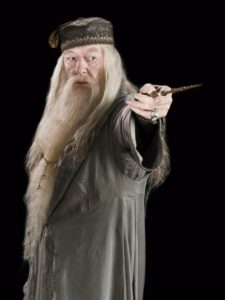 position in the Death Eaters and saving Draco from committing murder – but Dumbledore’s behaviour is inexcusable. Worse, perhaps. Dumbledore maintains his allergy to telling Harry anything useful right up until his last moments. He doesn’t tell Harry how to destroy the pieces of Voldemort’s soul, let alone anything else. That Dumbledore’s plan succeeded is more a matter of sheer good luck than careful planning.
position in the Death Eaters and saving Draco from committing murder – but Dumbledore’s behaviour is inexcusable. Worse, perhaps. Dumbledore maintains his allergy to telling Harry anything useful right up until his last moments. He doesn’t tell Harry how to destroy the pieces of Voldemort’s soul, let alone anything else. That Dumbledore’s plan succeeded is more a matter of sheer good luck than careful planning.
Harry himself seems to amble backwards and forwards in this book. He learns much, but most of it is largely useless. (Voldemort’s backstory is of little use to Harry and his friends in Book Seven.) He makes no attempt to keep Dumbledore’s Army alive, leaving the school without one set of defenders when all hell breaks loose. And he goes back to allowing Dumbledore to spoon-feed him information. But, on the other hand, he does better in potions … at least partly because he’s following the teacher’s instructions, which is what he should have been doing all along! (Hermione does well because she follows instructions and potions is a class where following instructions works. She doesn’t do so well when she has to improvise, something that Snape pointed out to her in DADA.) And he’s right about Draco – finally – being the threat.
Ron and Hermione don’t come off so well. I have a feeling that Rowling intended to give all three of her main characters a much-needed slap across the face in Books 4-6, but while Ron got his in GOF and Harry got his in OOTP, Rowling chickened out when it came to giving Hermione a reality check. She was never forced to take a good hard look at herself, something she desperately needed. And that is unfortunate, because there are quite a few plot threats from GOF and OOTP that could have been used. Instead, she effectively assaults Ron – which would be seen as unforgivable if Ron had assaulted her – and gets away with it. Her behaviour is odd, to say the least. She cheats to help Ron get his slot on the team, but gets angry at the thought of Ron doing the same. (And she could have got him disqualified if Hogwarts had any anti-cheating wards.)
Half-Blood Prince expands a little more on the Wizarding World, showing us the Minister for Magic talking to the Muggle Prime Minister (by timeline, Tony Blair) and Snape’s home outside Hogwarts. The former is interesting as it showcases the weakness of the Ministry and its inability to track down the Death Eaters; Rowling neatly satirises the British Government’s abysmal reaction to terrorism within the British Isles. Worse, perhaps, she also shows us one of Voldemort’s more cunning blows against the population; by ensuring that no one gets any consistent education in self-defence, even though the Wizarding World is effectively an ‘open-carry’ society, he renders much of the population helpless. (And no one seems to do anything about this, which is worse.) The Ministry doesn’t even seem to have fired Umbridge for her screw-ups (and outright child abuse), something that comes back to bite them hard in the final volume. But then, this is the Ministry’s core problem. It is strong – and heavy-handed – when it should be gentle; it is weak when it desperately needs to be strong. This is true of the modern-day British Government too.
The latter is also interesting as it shows Snape’s weakness, his desire – perhaps – to be one of the elite. (Perhaps that’s why he’s in Slytherin.) It’s clear, in hindsight, that Snape was no pureblood aristocrat; there are plenty of clues that he’s a common-born child within the text. (Rowling, it should be noted, gets the Lancashire attitude down pat.) He must have found it very satisfying to have Narcissa Malfoy, one of the beautiful elite, begging him for his help, which may have made it easier for Narcissa to manipulate him. (One reading of the scene is that Narcissa tricked him into vowing to finish the job.) He might well have seen little difference between Lucius Malfoy and James Potter. And that weakness, that very human weakness, may have cost him everything. The curse on the DADA position strikes again.
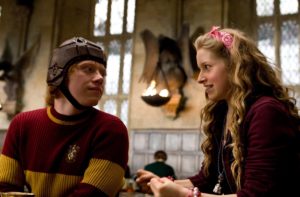 Half-Blood Prince also has far stronger romantic elements than any previous book. (I’ve been told that the movie plays this up, but I haven’t watched it.) Harry falls for Ginny; Ron starts a brief relationship with Lavender Brown; Hermione clearly fancies Ron, but sends him so many mixed messages that it’s hard to blame him for going out with Lavender instead … I’m glad that Rowling didn’t focus too much on this, but whatever she did couldn’t have pleased the shippers.
Half-Blood Prince also has far stronger romantic elements than any previous book. (I’ve been told that the movie plays this up, but I haven’t watched it.) Harry falls for Ginny; Ron starts a brief relationship with Lavender Brown; Hermione clearly fancies Ron, but sends him so many mixed messages that it’s hard to blame him for going out with Lavender instead … I’m glad that Rowling didn’t focus too much on this, but whatever she did couldn’t have pleased the shippers.
Worse, perhaps, we see a steady decline in morals. Harry tries to cast one of the Unforgivable Curses on Snape – something he also tried in OOTP – and successfully casts a jinx on Flitch, a powerless squib. One may argue that Flitch is an dickhead, but hexing someone who cannot defend himself is the mark of a coward. Later, Hermione hexes Cormac McLaggen (in order to make sure Ron got onto the team); McLaggen may be a jerk, but does he deserve to be cheated? And Ron and Ginny have a particularly savage argument that ensures that Ron and Hermione will not get together for another year. These are the people we are supposed to see as heroes? Snape, once again, puts everything into perspective:
“Fight back!” Harry screamed at him. “Fight back, you cowardly—–”
“Coward, did you call me, Potter?” shouted Snape. “Your father would never attack me unless it was four on one, what would you call him, I wonder?”
Harry has no answer. And Snape is right.
I have mixed feelings about Half-Blood Prince. There’s a lot about the book I like, from the development of some of the characters (even though Draco never becomes the pureblood prince of uncountable fan fictions) to the constant ambiguity over Professor Snape’s true allegiance. But there’s also the steady decline of characters I know and love, combined with plot holes and poor decision-making that makes one long for Barty Crouch Sr. Dumbledore seems to prefer to sit on his hands rather than actually do anything. His death leaves Harry (and Snape) up a certain creek, without a certain instrument.
But, on the whole, it is a stronger book than OOTP. It sets things up nicely for the final chapter.

Leave a comment